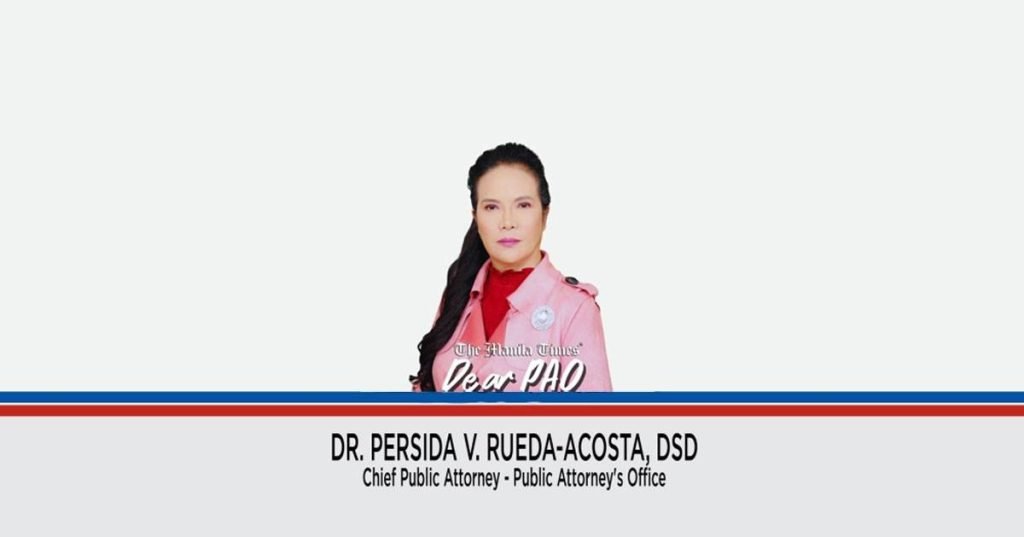
Dear PAO,
At the request of my then-friend, JR, I agreed to act as a guarantor for a loan he sought from our mutual acquaintance. Believing in his integrity, I consented. However, JR subsequently defaulted on the loan, leaving me responsible for the outstanding debt. Can our mutual acquaintance legally pursue me for the debt despite my not being the primary beneficiary of the loan?
Boyet
Dear Boyet,
Under the first paragraph of Article 2047 of the New Civil Code (NCC), [b]y guaranty, a person, called the guarantor, binds himself to the creditor to fulfill the obligation of the principal debtor in case the latter should fail to do so. The Supreme Court, through Chief Justice Maria Lourdes Sereno, in Rosalina Caroda v. China Banking Corporation (GR 210542, Feb. 24, 2016), described [a] contract of guaranty, [as] a collateral undertaking to pay the debt of another in case the latter does not pay the debt. This is so because, in a contract of guaranty, a guarantor agrees that the creditor, after proceeding against the principal, may proceed against the guarantor if the principal is unable to pay (Trade and Investment Development Corporation of the Philippines v. Asia Paces Corporation et al., GR 187403, Feb. 12, 2014, penned by Associate Justice Estela Perlas-Bernabe).
A guarantor, however, cannot be held accountable for any outstanding debt until the creditor has taken legal action against the principal debtor’s assets and the obligation is still overdue.
The Supreme Court, through Chief Justice Reynato Puno, pronounced that [i]t is only after the creditor has proceeded against the properties of the principal debtor and the debt remains unsatisfied that a guarantor can be held liable to answer for any unpaid amount. This is the principle of excussion (Spouses Alfredo and Susana Ong v. Philippine Commercial International Bank, GR 160466, Jan. 17, 2005).
It is clear that excussion may only be invoked after legal remedies against the principal debtor have been expanded. Thus, it was held that the creditor must first obtain a judgment against the principal debtor before assuming to run after the alleged guarantor, “for obviously the ‘exhaustion of the principal’s property’ cannot even begin to take place before judgment has been obtained (JN Development Corporation, et al. v Philippine Export and Foreign Loan Guarantee Corporation, GR 151060 and GR 151311, Aug. 31, 2005, penned by Associate Justice Dante Tiñga citing Baylon v. Court of Appeals, GR 109941, Aug. 17, 1999, penned by Associate Justice Minerva P. Gonzaga-Reyes).”
The JN Development Corporation case further declared that [t]he law imposes conditions precedent for the invocation of the defense. Under Art 2060 of the NCC, [i]n order that the guarantor may make use of the benefit of exclusion, he must set it up against the creditor upon the latter’s demand for payment from him and point out to the creditor available property of the debtor within Philippine territory, sufficient to cover the amount of the debt.
In the event that you settle JR’s debt, you will acquire all the rights the creditor has against him and will become his new creditor. As such, under Article 2066 of the NCC, JR is under the obligation to indemnify you of the following: 1) the total amount of the debt; 2) the legal interests thereon from the time the payment was made known to the debtor, even though it did not earn interest for the creditor; 3) the expense you incurred after having notified your friend that payment had been demanded from you; and 4) damages, if they are due.
Lastly, inform JR before you satisfy his debt because under Article 2068 of the NCC, [i]f the guarantor should pay without notifying the debtor, the latter may enforce against him all the defenses which he could have set up against the creditor at the time the payment was made.
We hope that we were able to answer your queries. This advice is based solely on the facts you have narrated and our appreciation of the same. Our opinion may vary when other facts are changed or elaborated.
Thank you for your continued trust and support.
Editor’s note: Dear PAO is a daily column of the Public Attorney’s Office. Questions for Chief Acosta may be sent to [email protected]






